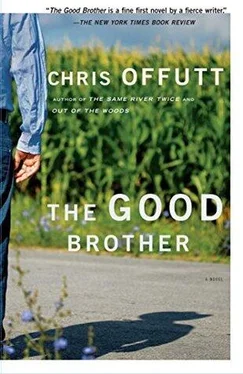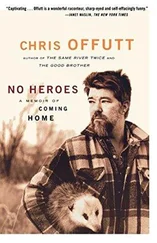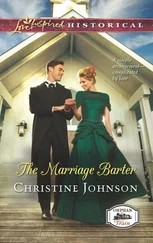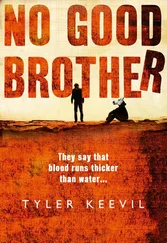“That’ll just get him in trouble.”
“He’s already in trouble,” Owen said. “He says they’ll come after him sooner or later, and if speaking his mind makes it sooner, that’s fine with him.”
Joe slowed for a turn, feeling the transmission strain in the lower gear. Wind carried smoke down the valley to block the moon. The last person he’d retrieved from jail had been Boyd when he’d been charged with public urination for using bushes at night. A Rocksalt lawyer had told him it would get thrown out of court but Boyd was found guilty and fined two hundred dollars. The judge had told him to stay in the hills where he belonged.
“I got to tell you something,” Joe said. “I don’t understand this whole mud people business. Or the Jews and banks stuff, either, I don’t much care for it.”
Joe sped along a straight stretch. Owen shifted toward him and took a deep breath.
“Let me put it this way,” Owen said. “If a black man has pride, it’s good. And if an Indian has pride, it’s good. But let a white man have pride, and he’s bad. Now why’s that?”
“I don’t know anything about it.”
“What’s good for the goose is good for the gander. White man’s got to stick up for himself,”
“Against who?”
“Everybody. Nobody’s watching out for us. A white can be the best man for a job, but another man gets it because of his skin color. That’s racism, Joe, pure and simple.”
“Maybe so,” Joe said, “but you can’t fight prejudice with more prejudice.”
“The races are supposed to stay separate. That’s what the Tower of Babel is about. You know that story, right?”
“Sure,” Joe said. “The old-time people built a big tower and God didn’t like it. So he made them speak different languages.”
“You know your Bible,” Owen said. “And those languages are the races. God wanted them to stay apart.”
“That’s not what the Bible says.”
“Then let’s look at it another way. Who gets all the government services in this country? The cities. And you know who lives there? Mud people.”
“Folks where I’m from get a lot of government help,” Joe said. “And we’re white.”
“What kind of help?”
“Doctors, welfare, and food stamps mostly.”
“Where the hell is that, a Rez?”
“No, down south. And sort of east.”
The sky was black, specked with stars. The air had cooled. Autumn would soon start here, while Kentucky was still boiling with misty heat.
“Let me ask you something,” Owen said. “Why are you with me right now?”
“Partly for Botree,” Joe said. “Plus nobody else could help that lady get out of jail. She’s the same age as my mom.”
“All right,” Owen said. “You got your reasons and I respect them. Maybe you’ll come around to the rest of it.”
“Don’t count on it.”
Trucks roared past the Jeep. The glow of Missoula rose in the sky ahead. Joe parked in the jail lot and Owen left the jeep, holding the duffel bag. The CB emitted a steady hum, and Joe wished he had a regular radio that worked. The Bills reminded him of Kentuckians who remained loyal to the Confederacy, flying the Stars and Bars and swearing that the South would rise again. They forgot that Kentucky was never truly part of Dixie, and that secession had brought terrible destruction.
Owen came across the lot with a woman holding his arm and a policeman behind them. Owen helped her in the back. The cop circled the Jeep and wrote the license number on a small pad. He shined his flashlight in Joe’s eyes and asked for his license and registration. He seemed disappointed that Joe was legal.
“Ma’am,” Joe said. “Are you all right?”
“I’m fine, thank you,” Lucy said. “The son of a bitches never laid a hand on me.”
Joe glanced at Owen. “Any trouble?”
“None,” Owen said. “They didn’t want the gold at first, but they had no choice. Did you know you can use a credit card for bail?”
“No.”
“I couldn’t believe it. Makes it easier for rich folks to get out of jail.”
“It’s always easier for them,” Lucy said from, the back. “Surely you know that by now, Owie.”
“Ma’am,” Joe said, “would you like me to stop for anything?”
“Just take me home, please. And stop calling me ma’am. Going to jail made me feel young.”
Joe drove to her house in Lolo, where a woman waited on the porch. Lucy invited them in for a sip of brandy. They declined.
“Tough, ain’t she,” Joe said, as they drove away.
“Women here have to be,” Owen said. “Montana sent the first woman to Congress. Botree told me that.”
“She’s as tough as they come.”
“So was our mother. Nobody else could stand up to Coop but her. When she died, the whole place just generally went to hell. Then the bank tried to foreclose, and Coop barely beat that.”
“Botree said he had to sell, some land.”
“A lot of families did. Used to be, you could work something out with the bank but now the land’s too valuable. People are pouring in. I’ve been all over the West and it’s changing fast. A lot of little towns are ruined for good. Santa Fe and Aspen are the worst.”
“Where they coming from?”
“All over. The eastern cities and California, mainly. There’s not enough water and food for all these people. Hell, Montana can barely keep cattle alive.”
Joe dropped Owen at the bunkhouse and headed north toward town. He wasn’t ready for the ranch yet. He hadn’t driven alone in months, and didn’t realize how much he missed it. He wondered how many miles until Alaska.
Missoula was quiet. He passed the Wolf and a few taverns. Now that Joe was here, there was nowhere he wanted to go. He felt the same way about town that Boyd had.
He changed channels on the CB until he found the truckers’ band. The occasional scraps of conversation lent him comfort as he drove to the ranch. If he’d surrendered after shooting Rodale, he’d be in prison now, but receive letters and visitors. Most importantly, he’d have a date for release. Instead, he had a landscape that beguiled him with its light and space, a community that wasn’t his, and a woman in whom he could not confide. The promise of Alaska struck him as a last resort, like poison that a terminal patient keeps handy.
At summer’s end the days stayed hot while night took a jacket. The rivers were low and many creeks had dried to long skinny threads between patches of dusty earth. A series of lightning storms ignited several fires in western Montana. Smoke flowed along the valleys like water. It flooded basins and rose as if in a dam, spilling black air into the next network of open space between the slopes. Daylight was tinted by floating ash. Sunsets gleamed like neon.
Coop, Owen, and Johnny moved into the bunkhouse, leaving Joe alone with Botree. Joe hadn’t shared a bedroom with anyone except his brother, and felt awkward for a couple of weeks. He wasn’t sure who was supposed to turn off the lights at night, or make the bed in the morning. He worried about the protocol of undressing and getting into bed. Botree’s practical approach gradually relaxed him.
Every day after breakfast Botree gave the children school lessons, using mail-order textbooks that came with, guides and schedules. Dallas was performing math problems at a third-grade level, adding and subtracting rapidly in his head. He thought it fanny when Joe told him he still counted on his fingers at times. Botree used a system of phonics to help the boys learn to read.
While the children studied, Joe exercised his leg by walking a little farther each day. He followed the fence line into the woods and found a deer trail that led toward the river. His wounded leg was stronger, although pink scars surrounded his knee like ragged lace. He was slowly beginning to enjoy the open valley. With so much land in sight, there were few surprises. He could see an enemy coming from a long way off. Nothing would take him by ambush.
Читать дальше












